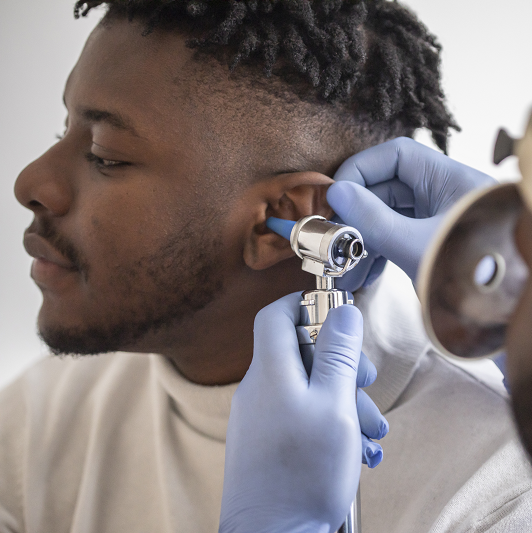Buying Hearing Aids Over the Counter? Read this First

October 04, 2022
In August 2022 the FDA ruled that certain categories of hearing aids could be sold over-the-counter (OTC), meaning consumers would not need a prescription or examination to buy them.
While this means that hearing aids will be more accessible for people throughout the US, there are some things you should consider before making a purchase.
Who is a good candidate for OTC hearing aids?
Over-the-counter hearing aids are approved for use in adults ages 18 and older who suffer from mild to moderate hearing loss.
Virginia Gural-Toth AuD, CCC-A, manager of Audiology, Tinnitus and Balance Programs at JFK Johnson Rehabilitation Institute, suggests asking yourself these three questions to help determine if OTC hearing aids are right for you:
- Are you able to hear easily during quiet one-on-one conversations?
- Are there situations where you may want to wear a hearing aid, such as group gatherings where there’s a lot of ambient noise in the room?
- Do you often turn the volume up on the TV or on your phone during a call to help you hear better?
“If you answer, ‘yes’ to all three, you could likely benefit from OTC hearing aids,” says Dr. Gural-Toth. “However, it is strongly recommended that you get a professional hearing exam first.”
An audiologist can measure your degree and type of hearing loss, and help determine if there are underlying medical conditions contributing to your hearing loss. At the end of the exam, they can also confirm that OTC hearing aids are the best option, or recommend something more appropriate for your specific needs.
Who should seek prescription hearing aids?
People who consistently have trouble hearing in all listening situations likely benefit from prescription hearing aids.
“I like to compare hearing aids to glasses,” says Dr. Gural-Toth. “You may be able to use an inexpensive pair of readers from the drugstore to help you occasionally throughout the day, but when you’re having trouble seeing in most settings and need glasses consistently, you know it’s time to get a prescription pair. The same goes for hearing aids.”
With prescription hearing aids, you’ll get a custom product programmed specifically for your type and degree of hearing loss. They’ll also be fit uniquely to your ears, and tuned at the level you need for a more natural and comfortable sound.
“The hearing aid devices that are being sold over-the-counter should only be used on an as needed basis,” says Dr. Gural-Toth. “If you need to wear hearing aids all the time, you probably need a prescription.”
How much do OTC hearing aids cost?
While it depends on the type you get, OTC hearing aids may cost about $300-$600 / ear.
“One of the benefits of OTC hearing aids is getting people the treatment they need, sooner,” says Dr. Gural-Toth. “But it is still a large expense and you want to be sure you’re doing what’s best for your health.”
How to Get a Professional Hearing Exam
If you’re experiencing hearing loss and are considering buying hearing aids, speak to your primary care physician. Your primary care physician can provide a prescription for a professional hearing exam and recommend an audiologist in your area.
Next Steps & Resources:
- Meet our source: Virginia Gural-Toth, AuD, CCC-A, manager of Audiology, Tinnitus and Balance Programs at the Center for Audiology at JFK Johnson
- Make an appointment with a primary care physician online or call 800-822-8905.
- Learn more about hearing loss and audiology services at Hackensack Meridian Health.
The material provided through HealthU is intended to be used as general information only and should not replace the advice of your physician. Always consult your physician for individual care.
Find a doctor near me

Can Hearing Aids Make Hearing Worse?
Improve your hearing. Learn if hearing aids can worsen hearing loss. Find expert advice and resources to help you hear better.

Advice for Buying Hearing Aids
Get expert hearing aid advice. Avoid online risks; schedule a hearing assessment with an audiologist at JFK Johnson Rehabilitation Institute for personalized care and optimal hearing health.
Find a doctor near me

Hearing Impairment and Masks: 8 Tips
Masking and social distancing during the COVID-19 pandemic has created significant communication challenges for people with hearing impairment.

8 Reasons to See an ENT
8 Reasons to See an ENT Doctor. Dr. Mina Le explains ear, nose, and throat conditions like vertigo, tinnitus, and nosebleeds. Find relief. Call 800-822-8905.

What Are the 3 Types of Hearing Loss?
Understand the 3 types of hearing loss. Learn about sensorineural, conductive, and mixed hearing loss from Dr. Gural-Toth. Schedule an appointment today.

5 Ways to Prevent Hearing Loss Caused by Headphones
While headphones can be incredibly convenient, they can also cause noise-induced hearing loss.
